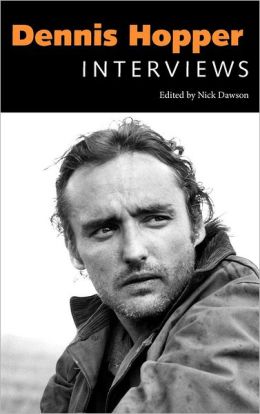 Editor: Nick Dawson. Conversations with Filmmakers Series Editor: Gerald Peary
Editor: Nick Dawson. Conversations with Filmmakers Series Editor: Gerald Peary
Publisher: University Press of Mississippi
Book Review by: Paiso Jamakar
It is interesting to learn that the well-known Hollywood cinema and television actor Dennis Hopper (1936-2010) was voted “mostly likely to succeed” by his graduating class at Helix High School in La Mesa, California.
He had several identities. But I recall seeing him mainly in Western television shows, whose titles I cannot remember now. He began his acting career in Hollywood in the 1950s. Among his notable movies was Easy Rider which he directed in the late 1960s. In the 1970s his roles were typically as a “bad boy” outcast. In the 1980s he had outstanding performances in the films Blue Velvet and Hoosiers. .
This book contains a large filmography of Dennis Hopper, for those of you who want to get the details of his life in movies as an actor and director. It also contains conversations with him from 1957 to 2009.
Hopper was not just an actor and director. He was also an art collector, painter and photographer. This book covers not only the significant points of his tumultuous time in Hollywood but also focuses on the lesser-known aspects of the man. In this highly informative volume – a collection of Hopper’s interviews with several people – he talks in depth about films, photography, art, and his battles with alcohol and drugs.
People more qualified to write about films and actors than I am would give a more “live” characterization of Dennis Hopper. Accordingly, Nick Dawson, who compiled material for this book you are reading – of which he is the editor, quotes New York Times film critic Manohla Dargis in a sort of pre-obituary appreciation of Dennis Hopper:
“Dennis Hopper – actor, filmmaker, photographer, art collector, world-class burnout, first-rate survivor – never blew it. Unlike the villains and freaks he has played over the decades – the psycho with the mommy complex in Blue Velvet, the mad bomber with the grudge in Speed – he has made it through the good, the bad, and some spectacularly terrible times. . . He has been rich and infamous, lost and found, the next big thing, the last man standing.”
So how would one sum up Dennis Hopper’s life in the movies? Nick Dawson writes in his Introduction:
“A case that can be made that Dennis Hopper’s cinematic imprint should have been much more significant. In the 1990s, he was a wonderfully over-the-top baddie in big, splashy blockbusters like Waterworld, Speed, and Super Mario Brothers, but when roles in high-profile movies dried up, he chose to keep on working regardless.
As a result, for the last decade of his life he was reduced to TV work, supporting roles in movies with small theatrical releases, or playing villains in straight-to-DVD fare. His last film was the children’s animation Alpha and Omega, in which he voiced the role of Tony, a cartoon wolf.
Hopper not only had to settle for substandard roles as an actor in his final years – decades earlier he had been forced to rebuild his career from scratch not once, but twice. First, he was blackballed after an infamous spat with director Henry Hathaway on the 1958 Western From Hell to Texas and was essentially exiled from Hollywood for eight years.
Then, in 1969, Hopper had the world at his feet after the phenomenal success of Easy Rider, which he directed, co-starred in, and co-wrote. However, just two years later, his iconoclastic (and prophetically titled) The Last Movie so baffled and offended both audiences and critics that Hopper was back in the wilderness again.”
Dennis Hopper, while leaving a significant body of work in films, could have had more success were it not for the fact that alcohol and drugs affected his relationships, work and life itself. Nick Dawson writes: “Poised to be an actor-director who would make influential and interesting films, Hopper saw his opportunity to establish himself as a true revolutionizing force in Hollywood disappear before his very eyes.”
Reading this book and the extensive filmography it contains of Dennis Hopper leads me to conclude that he made significant contributions to American cinema, even though his life was a checkered pattern of intermittent failures and successs.







